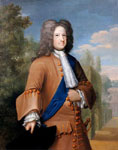Georg I. Ludwig
|
 |
 |
Georg Ludwig (1660-1727), elector of Brunswick - Lüneburg (Hanover) and, from 1714, king of Great Britain. He was the eldest son of Sophie (1630-1714), electress of Hanover, and elector Ernst August (1629-1698). In 1698 Georg Ludwig inherited, undivided, all the dominions of his father. The second son, Friedrich August (1661-1690), had to content himself with appanage and serve as officer abroad. In 1717 the youngest brother of Georg Ludwig, Ernst August (1674-1728), became the "secular bishop of Osnabrück." In 1682, while still electoral Prince, Georg Ludwig married his first cousin, the princess of Celle (Ahlden), Sophie Dorothea (1666-1726) of Brunswick - Lüneburg - Celle, the only daughter of Duke Georg Wilhelm (1624-1705). This marriage had been encouraged by Ernst August in order to avoid the possibility of a male heir to Georg Wilhelm's estate. After the death of his uncle in 1705, Elector Georg Ludwig was able to unite the principality of Lüneburg - Celle with the Electorate of Brunswick - Lüneburg - Calenberg (Hanover).
After the electoral princess Sophie Dorothea had brought a son and a daughter into the world, she was estranged from her husband. Georg Ludwig preferred his mistress of many years, Countess Melusine von der Schulenburg (1667-1743), and since 1690 Sophie Dorothea had a love connection to Count Phillip Christoph von Königsmarck (1665-1694).
Once their love interest had been discovered, the threat of a scandalous elopement involving Sophie Dorothea and Königsmarck became a serious concern to the Hanoverian court. Both Sophie Dorothea and Königsmarck had been warned to break off the affair, but the lovers lied about their involvement, which they continued despite the warnings. During the night of 1/l July 1694 Königsmarck was seen to enter the palace in Hanover and make his way toward Sophie Dorothea's apartments. Whether he reached them is unknown, but it is certain that he was killed that night. According to information gathered by Duke Anton Ulrich of Brunswick - Wolfenbüttel, the murder was the work of four courtiers from the court of Hanover. One of these, named Montalban, was identified as having struck the fatal blow. It has been discovered that shortly after 1/11 July Don Nicolò Montalbano, an Italian who had endeared himself to Ernst August's family during work on the new palace at Osnabrück, was paid 150,000 talers from Ernst August's coffers. At the time, Montalban's annual salary was merely 200 talers and that of the highest-paid electoral minister just 1,500 talers. So a reward of 150,000 talers was an extraordinary sum, leading to the not unreasonable suggestion that it was for Montalban's part in the assassination of Königsmarck. According to Anton Ulrich's information, Königsmarck's body was sunk in the Leine river in a sack weighted with stones. Matters moved apace in the aftermath of Königsmarck's disappearance. The marriage between Georg Ludwig and Sophie Dorothea was finally dissolved on 28 December 1694 (OS). As part of the agreement between her father Georg Wilhelm and Ernst August, Sophie Dorothea was banished for life to the family castle at Ahlden (Celle), completely separated from her children and her father1 and denied the right to remarry. Although endowed with a generous income and a court of her own, she was allowed to drive her carriage only under observation and only for a given distance; she was not allowed to walk on foot outside the courtyard at Ahlden.
At the time of Georg Ludwig's accession to throne of England, Leibniz was Librarian and Privy Counselor of Justice to the court at Hanover, where he had served for nearly forty years—first under Georg Ludwig's uncle, Johann Friedrich (1625-1679), and then under Georg Ludwig's father, Ernst August, who became the first elector of Hanover in 1692. Georg I. Ludwig, who had never fully appreciated the extent of his Privy Counselor's genius and fame, and had always been rather ill-disposed towards him, refused to summon Leibniz to join the royal family in London, ostensibly on the grounds that Leibniz had not made progress—sufficient, at least, to satisfy the King—on writing the history of the king's royal House of Brunswick with which he had been commissioned many years before. In December 1714 Leibniz petitioned the king, through Caroline (1683-1737), princess of Wales, and the king's Hanoverian Prime Minister, to make him historiographer of England on the grounds that his history of the House of Brunswick required him to take account of the history of England. The king refused, but Caroline continued to champion Leibniz's cause. In September 1715 she told Leibniz that she had again spoken to the king about his desire to become historiographer of England, but the king replied: "Er muss mir erst weisen daß er histroien schreiben kan; ich höre er ist fleißig [He must first show me that he can write history; I hear that he is diligent]" (Klopp, p. 46).
As king, Georg I. visited his Electorate five times, but on the sixth trip, in 1727, he died at Osnabrück. At his death, Georg I. left behind two heirs by his cousin and former wife, Sophie Dorothea: a son, Georg August (1683-1760), who became King George II. of Great Britain, and a single daughter, Sophie Dorothea (1687-1757), who in 1706 married the Elector of Brandenburg, later king of Prussia, Friedrich Wilhelm (1688-1740). Georg I. also left behind three illegitimate daughters by his mistress, Countess Melusine von der Schulenburg.
--Adapted from the website, Die Welfen
![]()
Notes
1Georg Ludwig did sanction visits to Ahlden by duke Georg Wilhelm, which were denied by the agreement of 1694. However, no visits took place for reasons unconnected with Georg Ludwig. Georg Ludwig also permitted Georg Wilhelm's widow to move from her dower-house in Lüneburg to the castle of Celle in order to make her frequent trips to visit her daughter less strenuous.
Sources
- The Encyclopaedia Britannica, 13th edition. New York: The Encyclopaedia Britannica, Inc., 1926.
- Aiton, E. J. Leibniz: A Biography. Boston: Adam Hilger, 1985.
- Hatton, Ragnhild Marie. George I: Elector and King. Cambridge, Mass.: Harvard University Press, 1978.
- Klopp, Onno, ed. Correspondenz von Leibniz mit Caroline. New York: G. Olms, 1973.
Web





